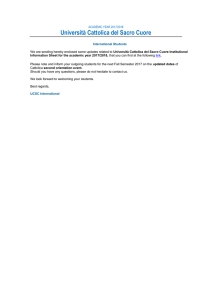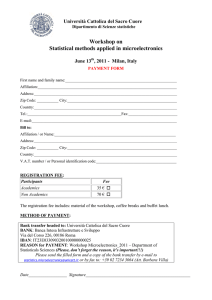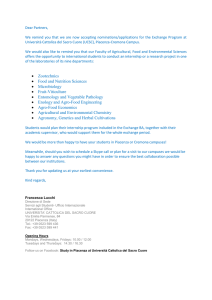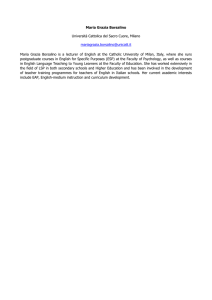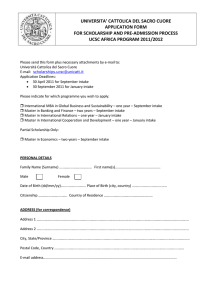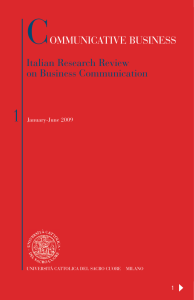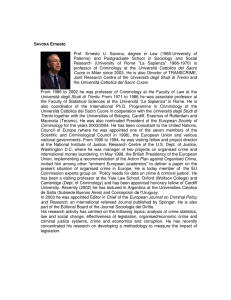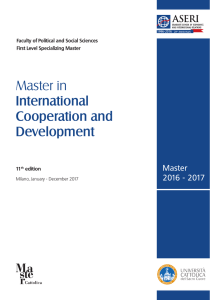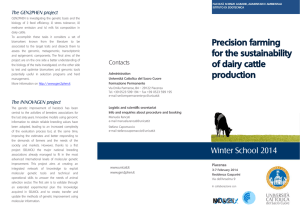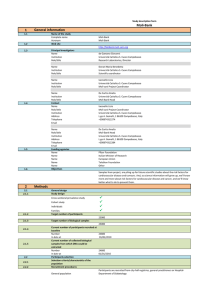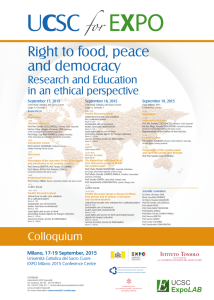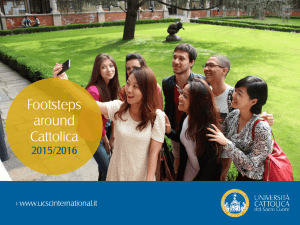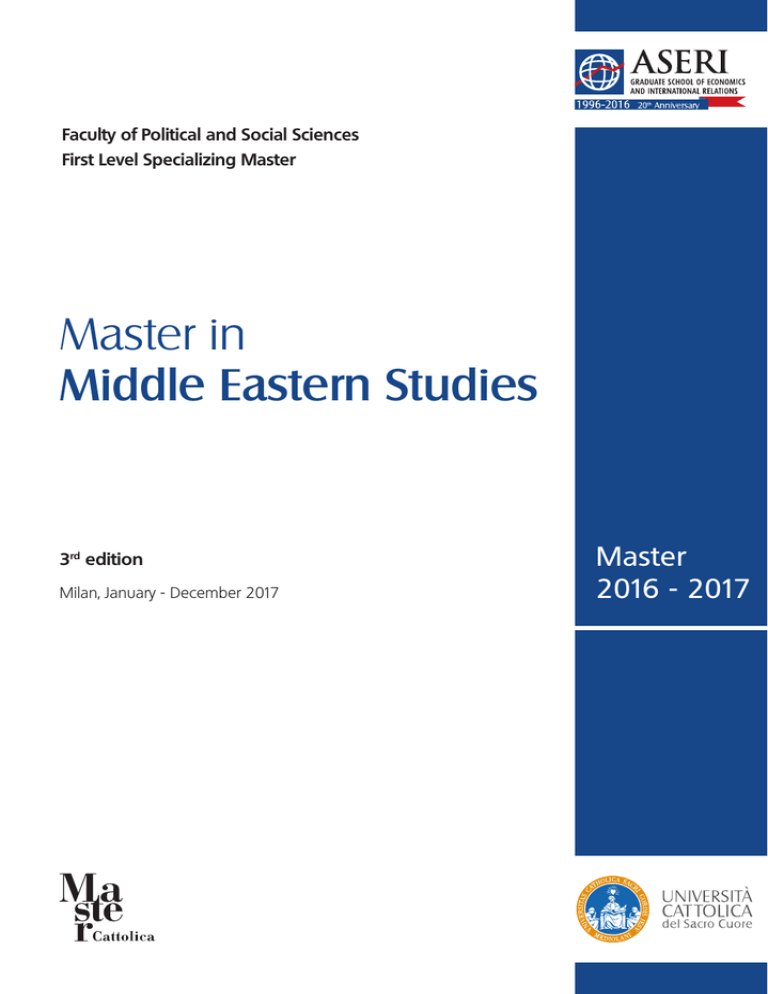
Faculty of Political and Social Sciences
First Level Specializing Master
Master in
Middle Eastern Studies
3rd edition
Milan, January - December 2017
Master
2016 - 2017
The Master in Middle Eastern Studies - MIMES is specifically tailored
for graduates of various disciplines and backgrounds, who are interested
in obtaining a better knowledge of the Middle East region, taking into
account its social-historical complexity and cultural plurality.
The program aims to offer solid historical, political and institutional
perspectives of the current domestic, regional and international
dynamics affecting the stability of the region, as well as a
critical outlook on current debates over the Middle East.
Renowned professors from the Middle East, Europe and the U.S.
are part of its distinguished international Faculty, whose members have
generally a long experience as field-researchers or in situ professionals.
Goals
This innovative program aims to guide the students across this diverse and fascinating region, which, since
decades, is at the core of the geostrategic interest of the international system. The program mainly focuses on
the contemporary period, through a multi-disciplinary approach ranging over international relations, geopolitics,
conflicts and security, economy and energy. Nonetheless, specific sections are devoted to the analysis of the
historical and religious foundation of the modern Middle East, from the birth of Islam to the evolution of Islamic
thought, law and economy. MIMES analyses in details infra-regions and inter-regions peculiarities and relations,
from Maghreb to Central-Southern Asia, encouraging a comparative and holistic area studies approach.
Participants Profile
The Master’s program is designed for:
.
Young graduates throughout the world with a strong interest in the wider Middle East and willing to
specialize their competences.
.
Persons with a professional background who aspire to deepen their knowledge on Middle East sociocultural peculiarities and its political-economic dynamics.
The maximum number of admitted students is limited to 25, to ensure the high quality of learning and
interaction.
Placement Opportunities
MIMES provides graduated students with a detailed, comprehensive knowledge of the wider Middle East, beneficial
to undertake a number of different careers, consistently with their previous training and experience within:
.
.
.
.
.
international institutions
private companies
NGOs
research centers and area studies
media networks
Curriculum
MIMES is articulated in five complementary levels, fostering multidimensional training, cross-fertilization and
integrating scientific methodologies and operative competences.
1st level - Propaedeutic Phase: history, power
and institution: the conceptual foundation of the
Middle East
The first level provides students of different academic
backgrounds with a broad knowledge of the Middle
East, the rise of Islam and its characteristic, with an
accurate analysis of the historical evolution of the
region and its role within the international system. A
dedicated course will offer a linguistic analysis of the
political and juridical terminology and a glossary in
Arabic.
. Methodological introduction: debates on the
Middle East
. History of the Middle East
. Religion, society and thought in the Islamic Middle
East
. Islamic law and economy
. Study of political and juridical terminology - glossary
in Arabic
. Middle East within the 20th century international
order
2nd level - In-depth Analytical Phase: sub-regional
contexts
Students, during the second level, acquire a detailed
knowledge of different sub-regions of the wider Middle
East, focusing on their peculiarities and connections
with regional and international geopolitical trends. The
program encourages the adoption of a comparative
methodology, emphasizing the conceptual dichotomy
continuity/change, within an historical-political narrative.
. Maghreb
. Mashreq
. Sub-Saharan Africa
. South-West Asia and the Gulf
. Central-Southern Asia
3rd level - Thematic and Contemporary Issues
During the final class term, the program offers a
wide portfolio of specializing courses on the most
relevant political, geoeconomic and security events
and dynamics contributing to the current Middle
Eastern unbalances. The program aims to underline
in particular the role of the region within the larger
international system, and the lesson learnt during the
post-Cold War period.
. Politics in contemporary Middle East and the current
International Relations context
. Global security: jihadism, violent activism, conflicts
and nuclear proliferation
. Post-conflict institution-building and human security
. Gender, ethno-religious diversity and pluralism in
the Middle East
. Energy and the geopolitics of resources
. Contemporary economic trends
4th level - Project work
In order to get the final diploma of the Master in
Middle Eastern Studies students are required to write a
personal project work consisting of an interdisciplinary
and critical analysis of a specific issue related to Middle
Eastern affairs. The specific subject, agreed with a
MIMES professor (supervisor), must be approved by
the Director of the Master. It is suggested to connect
the project work to the internship experience. Scientific
knowledge acquired through the Master’s courses
constitutes the scientific background necessary to
develop the research project.
5th level - Internship or language course
The Master’s program is completed with an internship
in Italy or abroad within an institution whose mission
and activities are consistent with the Master’s program.
This gives the student the invaluable opportunity to test
and strengthen the competencies acquired during the
Mater’s program and it usually lasts three months.
As an alternative, students who do not carry out an
internship may choose to attend an Arabic, Persian
or Turkish language course. In any case, the course
will have to be positively evaluated by the Master’s
Direction (additional fee depending on the organizing
institution may occur).
Students will receive support and tutoring for their
internship research, specifically concerning CVs and
cover letter preparation, vacancies research and
internship announcements indication.
Faculty
The Master in Middle Eastern Studies offers high quality training to students from all over the world. They will take
part in team projects with the guidance of important scholars and leading professionals from the Middle East as
well as from Europe and the U.S.
.
.
.
.
.
.
.
.
.
.
.
.
.
.
.
.
.
.
.
.
.
.
.
.
.
.
.
.
.
.
.
.
.
.
Prof. Riccardo Redaelli, MIMES Director, Università Cattolica del Sacro Cuore
Dr. Giuseppe Acconcia, University of London and Il Manifesto
Dr. Ibrahim Al-Marashi, California State University San Marcos
Prof. Paolo Branca, Università Cattolica del Sacro Cuore
Prof. Massimo Campanini, Università degli Studi di Trento
Dr. Andrea Carati, Università degli Studi di Milano
Dr. Claudia Castiglioni, Sciences Po Parigi
Dr. Raul Caruso, Università Cattolica del Sacro Cuore
Dr. Antonio De Lauri, Università degli Studi di Milano-Bicocca
Prof. Barbara De Poli, Università Ca’ Foscari Venezia
Prof. Martino Diez, Fondazione Internazionale OASIS and Università Cattolica del Sacro Cuore
Prof. Wael Faruq, American University in Cairo
Prof. Ersilia Francesca, Università degli Studi di Napoli L’Orientale
Dr. Gennaro Gervasio, British University in Egypt
Prof. Rony Hamaui, Mediocredito Italiano and Università Cattolica del Sacro Cuore
Prof. Mehran Kamrava, Georgetown University’s School of Foreign Service in Qatar
Prof. Bahgat Korany, American University in Cairo
Prof. Marco Lombardi, Università Cattolica del Sacro Cuore and ITSTIME
Prof. Elena Maestri, Università Cattolica del Sacro Cuore
Dr. Paolo Maggiolini, Università Cattolica del Sacro Cuore and ISPI
Prof. Maurizio Martellini, Landau Network Fondazione Volta -LNCV and Insubria Center on International Security -ICIS
Dr. Francesco Mazzucotelli, Università di Pavia and Università Cattolica del Sacro Cuore
Ms. Masoumeh Mirsafa, Politecnico di Milano
Prof. Massimo Papa, Università di Roma Tor Vergata
Prof. Vittorio Emanuele Parsi, Università Cattolica del Sacro Cuore
Prof. Aldo Pigoli, Università Cattolica del Sacro Cuore
Prof. Andrea Pin, Università degli Studi di Padova
Dr. Andrea Plebani, Università Cattolica del Sacro Cuore
Prof. Mahmood Sariolghalam, Shahid Beheshti University of Tehran
Avv. John Shehata, Bonelli Erede and Nuovo Istituto di Business Internazionale-NIBI
Ms. Valeria Talbot, ISPI
Prof. Oktay Tanrisever, Middle East Technical University, Ankara
Amb. Roberto Toscano, Barcelona Center for International Affairs - CIDOB
Dr. Massimiliano Trentin, Università di Bologna
Entry Requirements
.
.
.
A minimum three-year university Degree
English proficiency
Strong motivation
TOEFL/iBT, Academic IELTS or having completed a degree program taught in English are considered a
preferential requirement for applicants whose first language is not English.
Application Procedure
Applicants will be required to submit an online application form along with their supporting documents:
.
.
Copy of Bachelor’s Degree or Master’s Degree
Transcripts of Bachelor or Master’s Degree (accepted
in English, Italian, French, Spanish and Portuguese)
.
.
.
.
Application essay (available online)
At least one academic letter of reference
Copy of passport
Updated CV
More information are available in the section How to apply of the Master at http://aseri.unicatt.it.
Deadline
Application deadline: October 31st , 2016
Application are open and will be evaluated in an ongoing process. Since the Master has a limited number of
places, early applications have a greater chance of being successful.
Tuition Fees
Tuition fee: € 7,500.
Partial tuition fee scholarships for international students are available (for more information: http://www.
ucscinternational.it/admission-at-ucsc/1-year-specializing-masters-admissions/tuition-fees-and-scholarships)
The tuition fee also includes:
.
.
.
Tutoring service
Access to University facilities and services
Teaching material
At a glance
School
ASERI - Graduate School of Economics and International Relations
Program type
First Level Specializing Master (“Master Universitario”)
Campus
Milan, Italy
Language of instruction
English
Duration
January 2017 - December 2017
.
.
January -June 2017: classes and exams
July-December: internship and project work
Total ECTS
60
Application deadline
October 31st 2016
Tuition fee
€ 7,500
The ASERI difference
Since 1995, ASERI has been working to understand the deep
changes occurring in the economic and political environment
with the beginning of globalization. ASERI’s students, who come
from all over the world and have different cultural backgrounds
and ages, have been educated through Master’s courses and high
level postgraduate training programs.
Given to its expertise and multi-disciplinary nature, the ASERI
approach offers a strong functional understanding of international
issues and processes.
Contacts
Università Cattolica del Sacro Cuore
ASERI - Graduate School of Economics and International Relations
Via San Vittore 18, 20123 Milano - Italy
Tel. +39 02 7234 8310
Fax. +39 02 7234 8320
aseri.unicatt.it
[email protected]
aseri.unicatt.it/mimes

